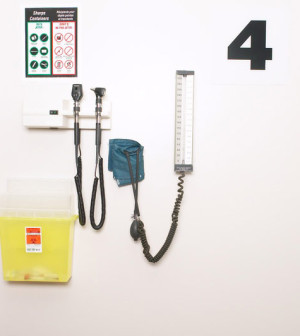- 8 Ways to Increase Dopamine Naturally
- 7 Best Breads for Maintaining Stable Blood Sugar
- Gelatin vs. Collagen: Which is Best for Skin, Nails, and Joints?
- The Long-Term Effects of Daily Turmeric Supplements on Liver Health
- Could Your Grocery Store Meat Be Causing Recurring UTIs?
- Are You Making This Expensive Thermostat Error This Winter?
- Recognizing the Signs of Hypothyroidism
- 10 Strategies to Overcome Insomnia
- Could Artificial Sweeteners Be Aging the Brain Faster?
- Techniques for Soothing Your Nervous System
Low Vitamin D Could Up Risk for Birth Complication: Study


Vitamin D deficiency during the first 26 weeks of pregnancy may raise an expectant mother’s risk of developing a severe form of high blood pressure called preeclampsia, a new study suggests.
In what they termed one of the largest studies to date on the link, researchers analyzed vitamin D levels in blood samples from 700 pregnant women who later developed preeclampsia and 3,000 pregnant women who did not develop the potentially life-threatening condition.
The overall risk of severe preeclampsia among the women in the study was 0.6 percent. Having sufficient levels of vitamin D was associated with a 40 percent reduced risk of severe preeclampsia. There was no association between vitamin D levels and mild preeclampsia, according to the study. While the study showed an association between vitamin D levels and preeclampsia risk, it did not prove a cause-and-effect link.
“For decades, vitamin D was known as a nutrient that was important only for bone health. Over the past 10 to 15 years, scientists have learned that vitamin D has diverse functions in the body beyond maintaining the skeleton, including actions that may be important for maintaining a healthy pregnancy,” study author Lisa Bodnar, an associate professor in the epidemiology department at the University of Pittsburgh Graduate School of Public Health, said in a university news release.
“Scientists believe that severe preeclampsia and mild preeclampsia have different root causes. Severe preeclampsia poses much higher health risks to the mother and child, so linking it with a factor that we can easily treat, like vitamin D deficiency, holds great potential,” study senior author Dr. Mark Klebanoff, of the Center for Perinatal Research at Nationwide Children’s Hospital, and the pediatrics department at Ohio State University’s College of Medicine, said in the Pitt news release.
Bodnar emphasized, however, that further study on the issue is needed because a definite link between vitamin D levels and preeclampsia risk has not been confirmed.
“Until then, women shouldn’t automatically take vitamin D supplements during pregnancy as a result of these findings,” she said.
The study, funded by the U.S. National Institutes of Health, was published online in the journal Epidemiology and will be in the March print issue.
More information
The U.S. National Library of Medicine has more about high blood pressure in pregnancy.
Source: HealthDay
Copyright © 2026 HealthDay. All rights reserved.










